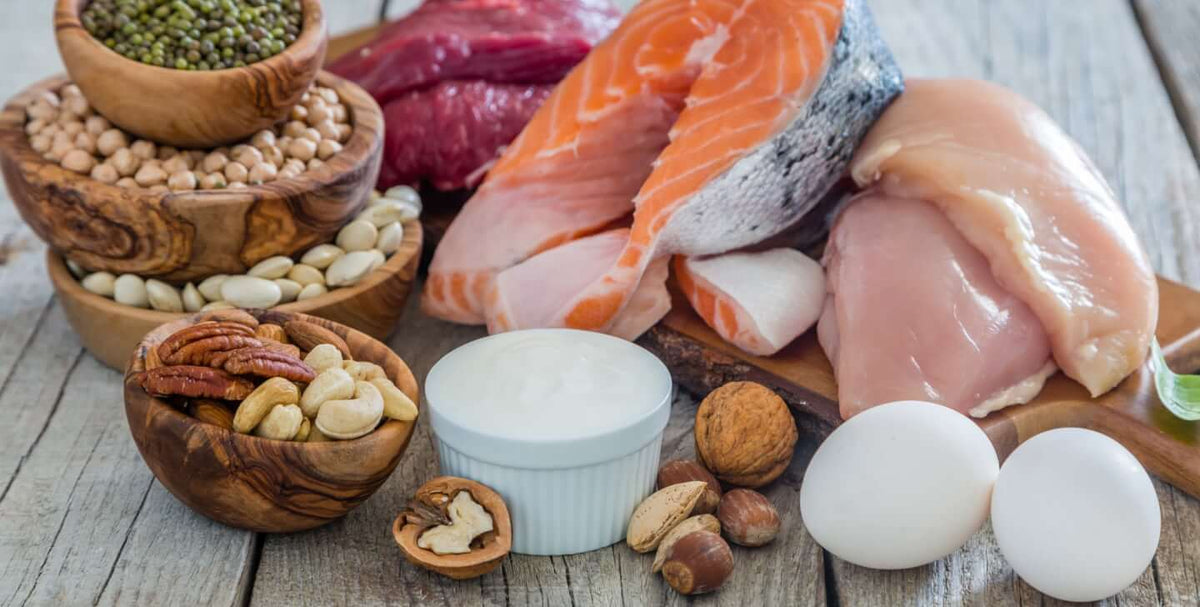6 Signs You're Not Getting Enough Protein

Protein plays a role in maintaining and building lean muscle mass, repairing muscle tissue, maintaining fluid balance, regulating hormones and energy, and maintaining immune strength. Sources include meat, plants, dairy, beans, legumes, and grains. Depending on what you eat, you may be getting too much (or, worse, not enough!) protein. But with the increase of plant-based diets, intermittent fasting, and nutrient-poor processed food intake, many people may not be getting enough high-quality protein to sustain their life and training. Here's what happens if you don't eat enough protein — six signs you may not be:
What Happens If You Don't Eat Enough Protein
Your Portions Are Too Small
Seems obvious, but just because you’re eating healthy food doesn’t mean you’re eating enough of it. Here’s a quick way to check your portion size without the hassle of a food scale. Ask yourself: Is my protein portion roughly the size of the palm of my hand?
Why the palm of your hand? Your hands are the perfect way to judge the appropriate size of protein for you. The small hands of a woman and the large hands of a six-foot-tall man are proportional to the size of the individual. By using your palm as a guide, you can feel confident that your protein portion is appropriate for you.
Related: 3 Protein Myths To Stop Believing
You Eat Less Than 3 Square Meals a Day
A skipped meal here or there is no big deal. But daily missed opportunities due to poor planning, a busy schedule, or too frequent intermittent fasting may not be the best idea. Consider this day:
Breakfast protein: two hard-boiled eggs (12 grams)
Snack: an ounce of almonds (six grams)
Lunch protein: three ounces of chicken on your salad (28 grams)
Dinner protein: three ounces of salmon with veggies (22 grams)
Now imagine you miss just one of those primary meals. Granted, there will be small amounts of protein in your veggies, fats, and grains, but you can see how quickly your primary sources add up. (Bonus: if you’re not a morning person, we’ve got your easy breakfast ideas covered.)
Related: 9 Easy Ways to Eat More Protein Throughout the Day
You're Not Seeing the Outcomes You Want
Protein plays a couple of roles in your strength routine. During the workout, it helps provide the energy needed to give it your all. After, it helps to rebuild and repair torn muscle. If your overall daily protein intake is below your needs, these two factors could be what’s stopping you from reaching your full potential. Get the biggest bang for your buck by getting in the right protein at the right time.
Related: Why Spartans Need Protein Before Bed
You're Always Hungry
Protein is the nice middle man of the macro world, breaking down more slowly than carbohydrates and slightly faster than fats. If you finish your meal and find yourself hungry within an hour or two, you may have been missing that vital protein portion that helped slow the rate of digestion. If this sounds familiar, try adding a quick protein, like a hard-boiled egg, to your next snack.
You've Recently Changed Your Diet
If you’ve recently changed to a diet approach that eliminates or minimizes meat intake (vegan, vegetarian, plant-based) and haven’t taken the time to educate yourself on alternative protein sources, you may not be fulfilling your needs. When most people make the swap, carbohydrates take center stage. A plant-based lifestyle can be great, but knowing how to maintain adequate protein intake mustn’t be overlooked.
Easy Plant-Based Proteins to Try
Half cup lentils, cooked: nine grams
Half cup kidney beans, cooked: eight grams
Half cup quinoa, cooked: four grams
One ounce chia seeds: five grams
Six ounces greek yogurt: 18 grams
You're Losing Weight
Isn’t that a good thing? Not when what you really want is fat loss, not lean muscle loss. Losing weight at a fast pace (two pounds or more per week in someone actively seeking weight loss) could indicate that part of that weight loss is lean muscle. This can happen in these situations:
- You aren’t taking in enough overall calories to support energy needs, causing your body to break down lean muscle to make up for that energy deficit.
- You aren’t working to maintain lean muscle. Our body naturally begins to lose about 1 percent of lean muscle mass around age 30. Not actively working to maintain that strength can result in lean muscle mass loss.
Double whammy: lean muscle is our calorie burner, so the more you lose, the less energy your body needs, making it harder to maintain ideal body weight.
Just How Much Protein Do You Need?
Specific needs are individualized and vary based on gender, age, and activity. General guidelines are:
General population: 0.8–1 gram per kilogram body weight per day
Recreational athletes: 1 gram per kilogram per day
Endurance athletes: 1.2–1.4 grams per kilogram per day
Ultra endurance athletes: 1.2–2 grams per kilogram per day
Strength athletes: 1.5–2 grams per kilogram per day
Related: The Protein Guide for Athletes: How Many Grams Do You Need?
The right nutrition starts with education, so know your needs and make adjustments. But do it Spartan style: Eat real food. Keep it simple.




